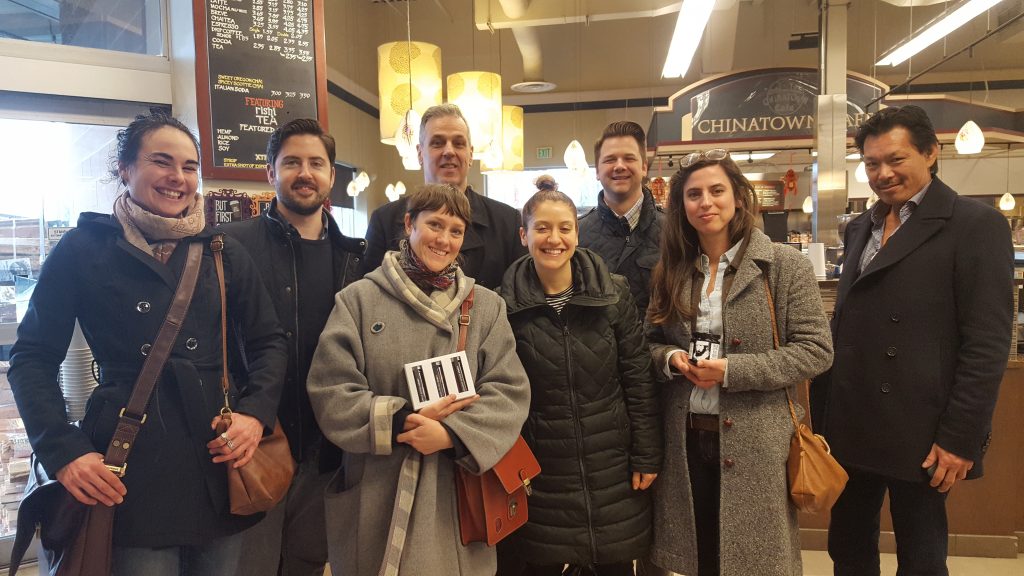When many small businesses think about growing their market, they often think about heading south to the US as a first step. The close proximity, similar culture and demographic make-up, makes it seem the obvious choice. But if you haven’t exported to another country before, and you’re not familiar with the retailers there, it can be difficult to know where to start.
New Exporters to Border States
On March 6 -7, 2017 Small Business BC participated in the Seattle New Exporters to Border States program (NEBS), to explore export opportunities for small businesses in the Pacific Northwest (PNW) and gain familiarity with the Seattle-area market.
The program, hosted by Kevin McCabe and Michael Wooff from the Consulate General of Canada in Seattle, included speakers on regulatory requirements and market intelligence, along with guided tours of prospective stores including New Seasons, PCC and Thriftway. Participants also had the opportunity to have one-on-one meetings with decision makers and store managers about stocking their products and deliver samples.
Meeting New and Familiar Faces
 The program was a great opportunity to connect with BC small businesses already considering exporting to the US. Our companions were:
The program was a great opportunity to connect with BC small businesses already considering exporting to the US. Our companions were:
Roasters Hot Sauce: A family run, gourmet hot sauce company located in Vancouver, BC. Their sauces are handcrafted in small batches. With all natural ingredients, they are perfect for the spicy food lover who doesn’t want to compromise on flavour.
Austin is a familiar face to us here at Small Business BC, having worked with him on his business plan and application to Vancity. After working hard with Business Plan Advisor Laura Aveledo, his application was approved in three days. Record timing.
Coast Protein: A premium brand of cricket protein bars. The bars are handmade in a New Westminster facility with B.C. grown ingredients.
Quejos Ancient Foods: These delicious cheese buns have no wheat, gluten, yeast, additives or preservatives. A modern version of the kind that sustained native populations in Brazil and Peru for thousands of years.
The Village Cheese Company: A small family-owned cheese company, who take great pride in making artisan cheese. Their cheeses are made from local whole milk from the Okanagan Valley and natural ingredients only.
East Van Jam: With gourmet flavour pairings and a mere fraction of the sugar, East Van Jam produces fun and guilt-free spreads inspired by the eclectic variety of characters that make East Vancouver so unique. Made locally with BC produce and so much love, less sugar means there’s way more fruit in every jar.
Earth’s Choice: Based in Vancouver, Earth’s Choice is committed to offering certified organic, affordable, delicious, and sustainable foods. Working directly with organic farmers, producers and suppliers – they make sure their product meet the highest quality standards with the lowest environmental impact.
Mellifera Bees: Mellifera Bees produces distinctive, hand-crafted honey infusions of exceptional quality. Each jar contains unprocessed honey harvested from ethically managed hives in backyards similar to yours, in neighbourhoods not so far from where you live, across Vancouver and the Lower Mainland.
Insights Gained on the Food and Beverage Market
The Seattle area market has evolved a lot over the last decade. With businesses like Amazon, Facebook and Microsoft employing large numbers of millennials, the city’s demographics have changed. Which means its business and product requirements have changed. Retailers now heavily promote locally sourced products, for the community supporting, environmentally conscious generation. Good news for BC small businesses, who are surprisingly considered local.
Another trend for food retailers is the specific marketing for dietary requirements – Vegan, Paleo, Gluten Free etc. Some stores are even altering their layout according to cater to these specific requirements. This advocacy creates an instant opportunity for BC producers of goods that cater to these requirements. But be aware of what organic, all-natural, non-GMO means to the US market. Many stores will not carry non-certified organic produce and there have been many lawsuits about the clear definition of what all-natural means.
Items that are no longer in demand include:
- Pasta: With health-conscious consumers turning away high-carb foods and seeking nutritious alternatives.
- Chemicals and Additives: Consumers are starting to look at the ingredients of products more. In a recent survey 36% of consumers were worried about chemicals in their food.
- Meat: Vegetables and meat substitutes are increasing in popularity, with consumers concerned with health and diet. Some restaurants are even classifying meat as a side dish.
- Sugar, Salt and Fat
Learn More About Cross Border Selling
If you’re interested in exporting your products or services to the US but want more information, check out our Are You Thinking of Exporting seminar, one-on-one Export Advisory and Ask the Shipping Expert services. Learn from advisors who have helped set up hundreds of export businesses, and gain the feedback you need from our qualified and knowledgeable experts.